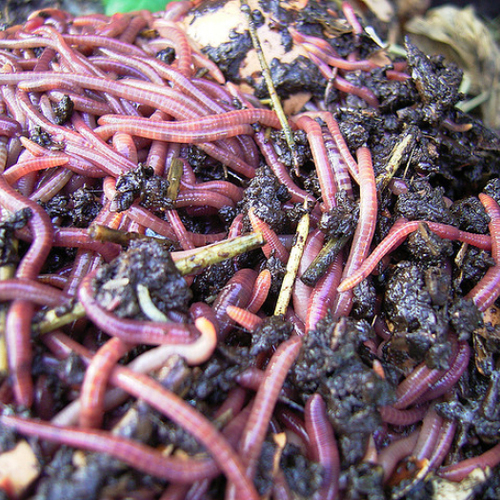Red wigglers: Transform organic waste
Red wigglers: Transform organic waste
Blog Article
Red Wigglers: The Secret to Eco-Friendly Composting
Red wigglers, scientifically recognized as Eisenia fetida, play a crucial duty in sustainable composting practices, providing a natural remedy to squander administration. red wigglers. These worms not just take in organic materials however also change them into important vermicompost, enriching soil health and promoting ecological equilibrium.
What Are Red Wigglers?
Although many individuals are familiar with earthworms, red wigglers (Eisenia fetida) are a specific varieties that play a crucial role in composting. Belonging to Europe, they have adjusted well to a range of atmospheres, specifically in breaking down organic issue. Unlike typical garden worms, red wigglers flourish in abundant, damp environments, making them perfect for composting systems.
(red wiggler farming)These worms are identified by their reddish-brown pigmentation and extended bodies, typically measuring between 3 to 4 inches in length. Red wigglers are epigeic worms, meaning they reside near the dirt surface area and feed on decaying organic product. Their high reproductive rate permits populaces to proliferate under ideal conditions, with the capacity to increase in number every couple of months.
Red wigglers have an unique digestive system that allows them to break down natural waste efficiently. Their lasting nature makes red wigglers a beneficial property in eco-friendly composting techniques.
Advantages of Utilizing Red Wigglers
Making use of red wigglers in composting systems provides countless advantages that boost both the efficiency of waste disintegration and the top quality of the resulting compost. These earthworms, medically called Eisenia fetida, are renowned for their exceptional capacity to take in natural waste, transforming it into nutrient-rich vermicompost at a remarkable price. Their fast digestion procedure accelerates the failure of kitchen area scraps and backyard waste, considerably reducing the time needed for composting.
In addition to their performance, red wigglers add to boosted soil structure and fertility. The vermicast generated by red wigglers is rich in necessary nutrients, helpful microorganisms, and humic acids, all of which enhance soil health and wellness and advertise plant development. This nutrient-dense garden compost helps maintain wetness and enhances oygenation in the soil, fostering a flourishing community for plants.
In addition, using red wigglers for composting decreases landfill waste, contributing to a much more lasting waste management system. By diverting natural products from garbage dumps, composting with red wigglers lessens greenhouse gas exhausts, making it an environment-friendly selection for environmentally conscious people and communities. Overall, red wigglers provide a reliable and lasting remedy for composting.
Establishing Your Worm Container
Developing a worm bin is a simple procedure that needs mindful consideration of materials and conditions to make sure a thriving atmosphere for red wigglers. Begin by choosing an ideal container, which can be a plastic bin or wood box, with a capacity of at least 10 gallons for effective composting. Make certain the bin has sufficient ventilation by piercing small openings in the lid and sides to enable air flow.
Next, prepare the bed linen, which is vital for keeping dampness and providing an environment for the worms. Suitable products consist of shredded newspaper, cardboard, more helpful hints coconut coir, or peat moss. Go for a bed linens depth of roughly 4-6 inches, ensuring it is wet however not excessively damp.
It is necessary to keep the ideal temperature level for your worm container, ideally in between 55 ° F and 77 ° F(13 ° C and 25 ° C) Setting the bin in a shaded location to avoid getting too hot. Furthermore, keep the bin away from straight sunshine and extreme weather to secure the worms.
Feeding Your Red Wigglers
Feeding your red wigglers is an important facet of successful worm composting, as it straight impacts their wellness and the performance of your composting system - red wigglers. Red wigglers prosper on a well-balanced diet regimen consisting primarily of organic waste products.
(red worms for sale)To make certain optimum feeding, it is crucial to present food gradually. Start with small amounts to enable the worms to take in the material fully before adding extra. This strategy protects against overfeeding, which can cause anaerobic conditions and negatively affect worm health. Display the food decay process and change the quantity based on how quickly the worms are refining the waste.

Keeping Your Worm Garden Compost System
A well-maintained worm compost system is vital for maximizing the performance and durability of your composting efforts. Regular surveillance of wetness levels is important, as red wigglers thrive in a wet atmosphere, preferably around 70% moisture. If the bed linens becomes too dry, lightly mist it with water; conversely, if it comes to be overly damp, include dry bedding such as shredded paper or cardboard to absorb excess moisture.
Temperature level control is additionally crucial. Guarantee your compost system is kept in a shaded, ventilated location to avoid overheating.
Check the worm population and their task; a prospering population suggests a well-balanced setting. By complying with these maintenance methods, you can ensure an effective and sustainable worm composting system that effectively reuses organic waste.

Verdict
In final thought, red wigglers play an essential role in environmentally friendly composting by successfully transforming natural waste into important vermicompost. Welcoming the usage of red wigglers stands for a practical approach to enhancing ecological sustainability and cultivating much healthier environments.
Report this page